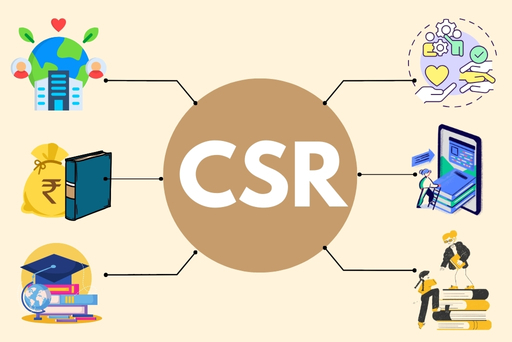Corporate Social Responsibility (CSR) has become a key part of business ethics, encouraging companies to give back to society. However, many corporations focus on one-time donations aimed at alleviating poverty—providing immediate relief but failing to create long-term impact. While these contributions are admirable, they often act as temporary solutions rather than sustainable change. The proverb “Give a man a fish, and you feed him for a day; teach a man to fish, and you feed him for a lifetime” perfectly illustrates this distinction. While direct monetary aid may provide short-term assistance, investing in skill-building and employment programs through NGOs ensures that individuals can sustain themselves for life. Organizations like NIIT Foundation exemplify how CSR funds can be used effectively to empower communities rather than just support them temporarily.
Beyond Donations: Creating Lasting Change
Many CSR activities involve companies donating funds to charitable causes. While this provides immediate relief, such efforts often lack continuity. In contrast, investing in NGOs that work directly with communities ensures a long-term impact. Organizations which focus on skill development, vocational training, and digital literacy, providing individuals with the tools they need to secure employment and improve their socio-economic status permanently.
Beyond Money: How Corporates Can Contribute Differently
While financial contributions are a vital part of CSR, companies and their employees can make a difference in other meaningful ways. Volunteering time and skills—such as mentoring, teaching, or offering technical expertise—can be just as impactful as monetary support. Professionals from various fields can assist NGOs by training youth, helping with digital transformation, or providing legal and strategic advice. Additionally, spreading awareness about an NGO’s work can amplify its reach, bringing in more donors, partners, and beneficiaries. A company that actively involves its employees in volunteering initiatives fosters a culture of social responsibility, making CSR a collective effort rather than just a financial obligation.
Choosing the Right NGOs: Financial Autonomy and Strong Leadership
To ensure CSR contributions drive real impact, businesses should partner with NGOs that have strong financial backing and independent leadership. Organizations with a well-structured governance model and an autonomous team can make objective decisions without external pressure, ensuring funds are allocated effectively. Financial autonomy also allows NGOs to sustain their programs beyond corporate funding cycles, reducing dependence on short-term grants. A strong leadership team, such as that of NIIT Foundation with domain expertise ensures that initiatives are well-planned, scalable, and aligned with the needs of the communities they serve.
Ensuring Transparency and Effectiveness
A major concern with CSR funding is ensuring that contributions are utilized effectively. Funds are often misappropriated, or wastefully spent, lowering the impact of one’s donation. NGOs with a proven track record, transparency, and measurable outcomes make better partners for corporate CSR initiatives. For instance, NIIT Foundation maintains detailed reports on the impact of its training programs, demonstrating how funds are directly improving lives. Companies that collaborate with such organizations can ensure their contributions are driving tangible change.
Aligning CSR with Corporate Vision
For CSR initiatives to be truly impactful, they should align with a company’s values and long-term vision. Businesses should seek NGOs that share similar goals—whether it’s promoting education, sustainability, or gender equality. By working with credible organizations, companies can create sustainable social programs that benefit both society and their corporate identity.
The Ripple Effect: From Training to Employment
One of the most effective ways NGOs create impact is by helping individuals with employment generation. NIIT Foundation, for example, provides digital literacy, vocational training, and employment opportunities, ensuring long-term financial stability for underprivileged communities. Instead of temporary relief, CSR funding in such initiatives leads to a self-sustaining cycle of growth and empowerment.
By choosing to fund well-established NGOs, corporations can go beyond charity and contribute to meaningful, long-lasting social transformation. CSR is not just about giving—it’s about creating opportunities that empower individuals for a better future.
Connect with NIIT Foundation today to discuss our initiatives in greater detail.
















